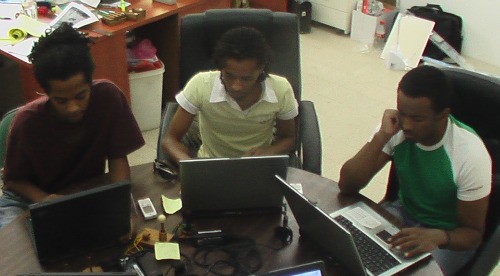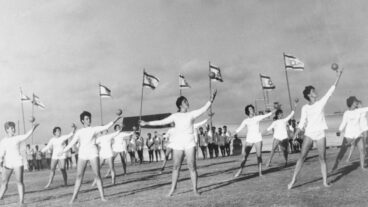IVN transforms a vicious cycle into a positive social cycle, providing non-profits with the strategies and tools that have made so many Israeli businesses successful.

Modern philanthropy is about more than giving. As the “donation pie” shrinks in these days of economic recession, non-profits and social service organizations are in need of innovative ways to raise money, manage themselves, and ensure their survival.
And that’s where Israel Ventures Network (IVN) comes in. IVN has helped dozens of organizations with positive social agendas to make an impact on their communities – and in some cases, on the entire country. The network accomplishes its goals by marshaling the knowhow and talents of some of the country’s top managers and executives, and putting their talents to work. Volunteers teach members of local organizations how to run their operations like a profitable business, so that tens of thousands of people can benefit from their programs.
Entrepreneurial skills enhance the social sector
“IVN was started by some of the most important entrepreneurs in Israel in order to bring management knowhow to organizations that seek to have an impact on society,” and many of these organizations were started by and for groups and populations that are far-removed from the upper echelons of society, says IVN director Daphna Murwitz.
“We work in a number of ways to help social service organizations bring their visions of a better society from concept to reality,” Murwitz explains. “Volunteers from the high-tech and business world use their business and entrepreneurial skills to train leaders and workers of organizations, teaching them how to survive in the long-term – which is especially important now, with donations harder to come by as a result of the recession.”
Entrepreneurs from some of Israel’s most successful companies – including Benny Levin, founder of NICE Systems, Ofer Shainberg of Concord Ventures, Ofer Timor of Delta Ventures and Jerusalem Mayor Nir Barkat – are now or have been mentors for companies that received assistance from IVN.
This current model is a change from the way IVN operated just a few years ago, when the organization was more involved in raising money for organizations and helping them to find their feet. Today, IVN teaches groups how to finance themselves, using innovative methods to raise money that can sustain groups, as opposed to seeking one-time donations.
IVN especially seeks out ideas and projects that can eventually be adapted to a larger scale, or that can be duplicated, Murwitz says, noting a jobs program organized with help from IVN that was started in the north by a private group following the 2006 Lebanon war. The model was so successful that the project was eventually taken over by regional government, and a similar program was instituted in the Negev.
“Programs like that, which can be replicated and expanded on a large scale – often by government – are the kind of programs IVN is looking for,” says Murwitz. In all cases, IVN looks for organizations that will have an impact on the community – creating jobs, and otherwise helping to foster an atmosphere of economic growth.
Beating the toughest social problems
Many of the organizations IVN helps are working on some of the toughest social problems facing Israel. For example, IVN was instrumental in developing a group called Tech-Career that trains Ethiopian immigrants for high-tech jobs. After six years of operation, Tech-Career has placed graduates in jobs throughout Israel’s top high-tech companies.
According to Tech-Career director Asher Elias, himself the son of Ethiopian immigrants, “all those who have gone through the course are working at well-paying jobs, mostly in programming. Some are making as much as NIS 20,000 a month.”
That’s remarkable for members of an immigrant community coming from a lifestyle and background so different from those of a modern, high-tech society. Now as a mature “start-up” training program, Tech-Career has the tools it needs to be responsible for its own management and to raise funds for its training and job placement efforts. It is considered a successful “graduate” of IVN.
IVN’s bootstrap philosophy is evident in the choices of all the groups it works with, such as Mishkan Hatchelet. This company specializes in manufacturing tallitot (prayer shawls) and other religious objects. It is located in Beersheba, one of the fastest growing – and one of the poorest – cities in Israel.
Much of Beersheba’s growing population is comprised of new immigrants, including many unskilled Jews recently arrived from Ethiopia and the FSU. Jobs are scarce, especially among these communities, and Mishkan Hatchelet has had a positive impact on the community, providing employment for more than 70 people.
Top execs mentor non-profits
Like all other IVN clients, Mishkan Hatchelet is being mentored by a top executive (in this case, Ron Moritz, a 25-year veteran of companies like Symantec and Microsoft), who guides the organization in setting business policy, marketing its products, manufacturing efficiency – in short, everything the organization needs to survive and thrive, expanding its operations and providing even more work in a jobs-starved region.
Click-Savi, another IVN client, is doing something similar with the elderly population. “Click-Savi puts elderly people to work making crafts, greeting cards, magnets, mobiles and many other items. Some of the workers are homebound, while others are able to come out to centers,” and enjoy the companionship of their fellow workers. But all participants enjoy a strong sense of accomplishment.
Click-Savi sells its products in a retail store and on the Internet, and the money is used to run additional programs for the elderly, financing social clubs, a day care center for disabled seniors, an occupational therapy program, and more. It’s an extremely well respected organization and there’s an on-line movie about its work.
Once again, IVN’s impact can be seen on the bottom line. “With the recession, the pie of donations to groups like this is smaller, so we see entrepreneurial innovation – using the tools of the marketplace to make a social impact – as the way to not only support groups like Click-Savi, but to ensure that they prosper,” Murwitz tells ISRAEL21c.
“Instead of reducing their services because of smaller contributions, Click-Savi and many other groups have, thanks to the mentoring and guidance of IVN, been able to expand their services, and have learned how to manage themselves and develop markets for their products and services, with the income and profits returned to the organization to create even greater social impact.”
IVN also works with a Negev organization that helps Bedouin women commercialize their traditional weaving skills; a group that turns organic garbage into high quality compost; and a website that helps to match employers with people seeking work.
Each of these groups works with populations in need, and IVN provides them with the tools to keep themselves in business, doing what they do best, says Murwitz, which is helping their clients. In a world where the “cycle” is usually a vicious one, IVN’s methods and strategies are helping to develop a much more positive social cycle – where the tricks and tools that have made so many Israeli businesses successful are recycled to bring that same success to the social service organizations working to improve the lives of Israel’s less-fortunate.












